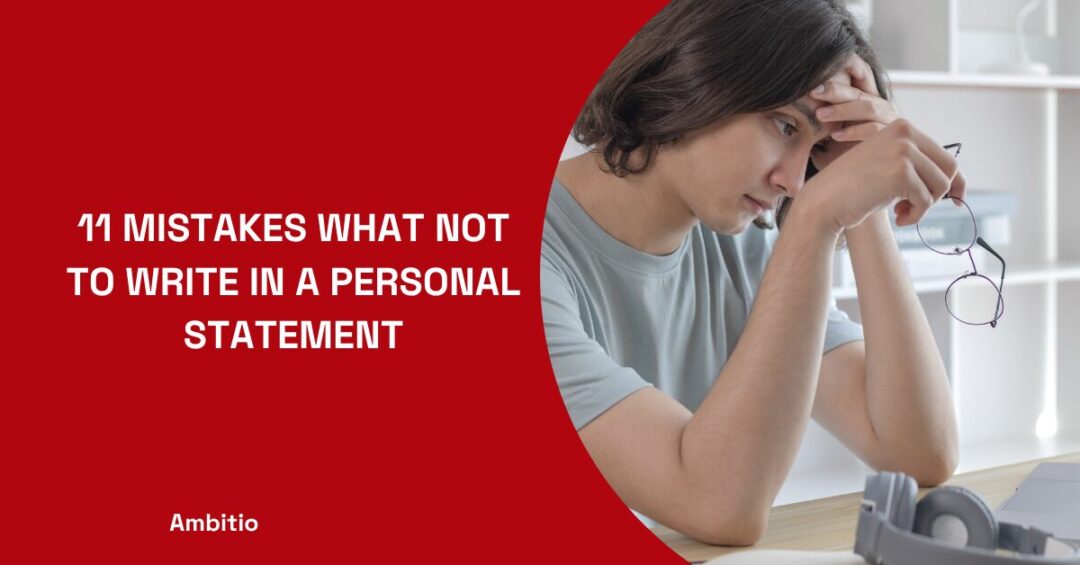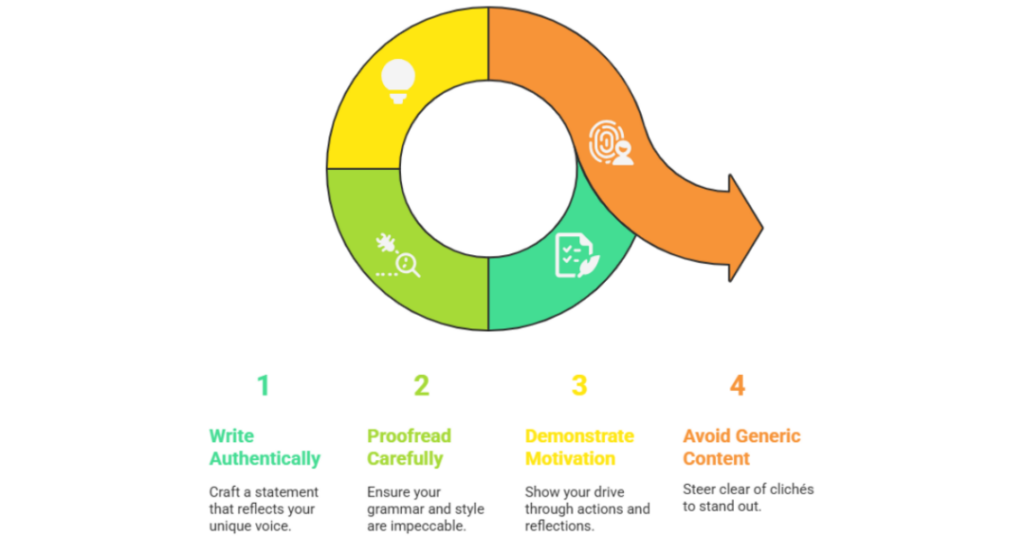6 June 2025
5 minutes read
11 Mistakes What Not To Write In A Personal Statement

Key Takeaways
- Know what not to write in a personal statement to avoid sounding like every other applicant.
- Start strong, skip the clichés, and keep your story relevant to the course.
- Focus on insights and outcomes instead of listing achievements or repeating your form.
“I want to attend your university because I’ve always dreamed of going to a great university.” — that’s not a quote, that’s a red flag.
Too many applicants treat their personal statement like a recycled essay: full of vague fluff, overused clichés, and the same safe lines they saw elsewhere. The result? Admissions officers skim, yawn, and move on. Brutal, but true. You’ve got 500 words to prove you’re more than just another candidate. Don’t waste it making the same mistakes everyone else does.
If you want your application to stand out, you’ve got to write smart. That means cutting the clichés, being relevant, and treating this like your one shot to actually say something. This guide is here to help you skip the cringe and write something worth reading.
What Is A Personal Statement In The Admission Process?
If a personal statement were a person, it’d be the one screaming “I’m passionate!” in every sentence—and still not getting the job. It’s wild how many applicants think they’re nailing it by repeating the same motivation, using flawless grammar, and discussing their childhood dream of becoming a doctor/lawyer/astronaut. But here’s the thing: admissions officers aren’t looking for perfect robots. They’re looking for real, sharp, self-aware humans who get it. And most applicants don’t.

Here’s what a personal statement really is (and what most people miss while applying in universities):
- It’s a self-pitch, not a life story or résumé recap
- It’s where your grammar shows whether you care—or copy-pasted from somewhere else
- It’s the only part of your application that can sound like you, so make it count
- It’s not about repeating your motivation, but proving it through action and reflection
- It’s the only space where the error of being generic can silently kill your shot without you knowing why
11 Mistakes Not To Write In A Personal Statement
Over 80,000 UCAS personal statements are submitted every year. Guess how many start with ‘Since I was a child…’? Way too many.
Welcome to the most overused, under-edited, grammatically-flawed part of the university application: the personal statement or as some people also call it statement of purpose. Many applicants treat it like a school essay—formal, forgettable, and packed with clichés that make admissions tutors silently scream. You’ve got 4,000 characters to impress, not depress. And trust me, nothing says “reject me” faster than a badly written sentence pretending to be deep.
So, let’s break the cycle. Here are 11 mistakes you should never write in your personal statement—because knowing what not to do is just as critical as knowing what works.
1. Starting with “Since I was a child…”
It’s the king of clichés in UCAS personal statements. Admissions tutors already know you didn’t come out of the womb wanting to study biomedical engineering. Start with something specific, something alive—an idea, moment, or insight that actually says something about who you are now, not who you were at age seven.
2. Listing achievements without context
Just dropping your grade or extracurricular like a grocery list? That’s lazy. Admissions officers aren’t impressed by what you did—they’re impressed by why it mattered and how it changed you. Context turns accomplishments into evidence of growth. Listing them blindly just shows you know how to brag.
3. Repeating things found elsewhere in your application
Don’t describe the same internship or award from your CV. Your personal statement needs to elaborate, reflect, and add value. If it’s already listed in your UCAS form, use this space to unpack what you learned, not just name-drop the experience again. Don’t waste precious space repeating yourself.
4. Writing like a robot with perfect grammar but zero personality
Yes, spelling and grammar matter. But so does voice. You’re not being tested on how formal you can sound—you’re being evaluated on how clear, human, and self-aware you are. Don’t let fear of a grammar mistake strip every ounce of your personality from the page.
5. Trying to cover everything you’ve ever done
Being well-rounded is great, but your personal statement isn’t a highlight reel. It’s a narrative. Throwing in everything from babysitting to basketball to biology club only shows you can’t prioritize. Focus on what’s relevant to the course and what actually builds your case as a strong candidate.
6. Using stylistic fluff to sound smart
Big words don’t equal big brain. Admissions tutors aren’t impressed by sentences you had to Google to understand. Fancy phrases often come across as insecure or inauthentic. Be analytical and persuasive, yes—but always use language that feels natural to you, not lifted from a thesaurus.
7. Focusing too much on extenuating circumstances
Unless it’s genuinely crucial to understanding your academic path, don’t let hardship dominate your story. Mention it if it impacted your grades or direction—but don’t make it the main plot. You’re not writing a sob story; you’re writing a case for why you’re ready for the rigour of university.
8. Telling a story with no connection to the course
That time you broke your leg and discovered resilience? Cool story. Not a good way to explain why you want to study law. If your story doesn’t link clearly to the course or your academic development, it becomes emotional noise. Every anecdote must earn its place in your statement.
9. Forgetting the character limit and waffling
4,000 characters. That’s it. Every sentence should pull weight. Don’t tempt the reader with grand philosophical intros or overused phrases like “I truly believe this is a great opportunity.” They add nothing. Every paragraph should be built to do something, not just sound impressive.
10. Writing for effect, not honesty
Trying too hard to impress can backfire. Admissions tutors can tell when you’re faking passion or using lines copied from guides or forums. If you wouldn’t say it in a room with a professor, don’t write it. Honesty will always read better than trying to game the system with buzzwords.
11. Not asking anyone to read it before submitting
One extra pair of eyes can catch a grammatical error, a confusing paragraph, or a sentence that totally misses the point. This isn’t just about proofreading a personal statement—it’s about clarity, logic, and making sure your statement comes across the way you think it does. Don’t edit in a vacuum.
Conclusion
Writing your personal statement isn’t about checking boxes—it’s about showing you beyond the grades. Most applicants fall into the same trap: using a cliche opener, repeating what’s already in their form, or trying to sound like someone they’re not.
Don’t tell university admissions what they already know. Show them what makes your story relevant, focused, and different. If your personal statement sounds like everyone else’s, it’s already lost.
Most applicants struggle to write a perfect personal statement, but end up making mistakes, but you won’t. At Ambitio, our AI-powered study abroad experts help you craft a powerful, standout statement that gets noticed. No fluff, no clichés—just a compelling story that proves you belong. Schedule a call with Ambitio’s experts.
FAQs
Should I use famous quotes in my personal statement?
No, avoid using quotations as they waste space and do not let your own voice shine through
Is it okay to list all my achievements and experiences?
Avoid random lists; focus on what you learned from your experiences rather than just listing them
Can I use clichés like “from a young age” or “I have a thirst for knowledge”?
No, these are overused and do not make your statement stand out
Should I make sweeping statements about my abilities?
No, avoid unproven claims; instead, provide specific examples to support your strengths
Can I use the word “passion” frequently?
Limit the use of “passion” or “passionate”; try to show your passion through your actions and experiences, not just the word itself
Is it good to use overly complex or stilted vocabulary?
No, use clear, natural language that reflects your authentic voice

You can study at top universities worldwide!
Get expert tips and tricks to get into top universities with a free expert session.
Book Your Free 30-Minute Session Now! Book a call now




























